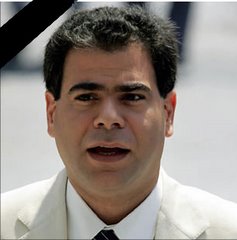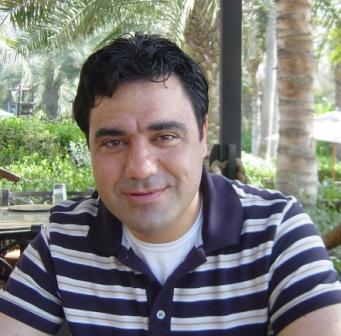It's the story of our people living on the south... decades ago
Rebuild or wait? The Lebanese dilemma
by Sammy KetzSun Aug 6, 5:44 PM ET
At 75, Alia Mattar is an unshakeable optimist. Already she is looking for stonemasons to repair fissures in her house caused by the shock waves of Israeli bombs hitting Naameh bridge, 15 kilometres (nine miles) south of Beirut.
"What do you expect? You have to live as well as you can," says the grey-haired lady who keeps on smiling despite 30 years of misfortune.
At 11:00 pm (2000 GMT) on July 20 Alia thought her last moments had come when the bridge was attacked.
She was thrown from her bed, and a wardrobe fell on top of her.
"It was like in Asia," she says. "The tsunami. There was dust everywhere."
As she speaks, Alia wields a brush in a bid to sweep the floor clean.
"I cried out 'Mar Elias, (Saint Elias), save me!' and 'Elias -- are you still alive?'," she recalls.
A Maronite, she reveres Saint Elias and prays to him. Her son, who was on the first floor on the night of the air strike, is named after the saint.
Since then her four sons have gone. Elias, Michel, Georges and even Khalil, who shared the same apartment as his mother, have decamped to Beirut.
But Alia stayed on. She inherited this land on which the house stands from her mother. After she married and had her children, she built a three-storey home to house her family.
Since her home was first built, it has known the vagaries of war.
In January 1976, it was ransacked by Palestinian groups during a massacre of Christians at nearby Damour. And in 1982 it was destroyed by Israeli bombardment when the Jewish state invaded the country.
So Alia rebuilt.
A year later she was once again visited by bad luck in the form of the "mountain war" between the Christians and the Druze.
In 1984, Druze chief Walid Jumblatt's militiamen seized coastal towns and the Christian population fled. When she returned two years later, Alia found her house completely wrecked.
No matter. Without further ado, she gathered her sons around her and again they rebuilt the home they had known before.
But again it did not last long. In 1989-1990, a war between two Christian leaders, Samir Geagea and Michel Aoun -- as pitiless as it was absurd -- transformed part of the Christian areas into a landscape pitted with ruins.
Alia's house may have suffered badly over the years, but her spirit has not. She picked up the pieces again.
Then came July 20, 2006.
"My husband died of an aneurism in 1987 because he was worrying too much," she says. "Me? I believe in luck."
Three weeks after Israel launched its assault on Lebanon, the government estimates it will take 2.5 billion dollars and three years to repair the infrastructure and rebuild homes flattened by air strikes.
Alia says she will not wait for hypothetical government compensation before starting work on the house once more.
"It's the only thing I have, and nobody will help us," she says.
Her Sunni neighbour Mamoun Gazuli, a 58-year-old upholsterer, is already fixing the entrances to apartments in his building that were damaged by the blast wave.
"You think I'm going to wait for help?" he asks. "It will never come."
It is not the first time Mamoun has had to repair his house either.
He used to live in a villa in a lovely location. But he should have checked out the neighbours before moving in.
Mamoun found himself living beside a camp run by Ahmed Jibril's Popular Front for the Liberation of Palestine-General Command (PFLP), and each time Israeli warplanes attacked it his home also suffered.
But Mohammed Jishi, a 65-year-old Palestinian and a former ping-pong champion, is completely depressed -- even though he and his wife and daughter have been spared in the conflict.
At the age of six, his family left his birthplace of Acre for Lebanon in 1948, when the state of Israel was declared. When he was 17, diploma in his pocket, he moved to Kuwait where he lived until it was invaded by Iraq in 1990.
After the 1991 US-led war to liberate the Gulf emirate, Mohammed Jishi was chased out of the country because he was Palestinian -- Palestine Liberation Organisation chief Yasser Arafat had supported Saddam Hussein the invader.
He moved into a flat near the highway leading to the Naameh bridge.
Jishi did so because he wanted "some peace and quiet", a wish rudely shattered by Israeli bombs.
Like a ball in the game at which he used to excel, Mohammed is tired of being batted back and forth.
"I've had enough of having to move and having to rebuild," he tells AFP. "Now I'm going to wait."
Monday, August 07, 2006
Subscribe to:
Post Comments (Atom)





No comments:
Post a Comment